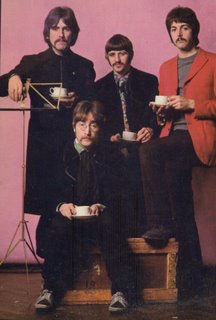
Here’s a list whose contents change from time to time but essentially, to me, these are the best of the best and I could listen to any one of them endlessly. That doesn’t mean I don’t like Fleetwood Mac or the Doors or Sugar Ray or Matchbox 20 or even Mungo Jerry. It just means that, to me, at this moment in time, the music created by these ten groups is my favorite. Feel free to disagree.
Okay, here we go:
The Beatles
Pink Floyd
The Who
The Yardbirds
The Pretty Things
The Monkees
Elvis Costello and the Attractions
The Beach Boys
The Moody Blues
Crosby, Stills, Nash and Young
1) The Beatles didn’t just lead the British Invasion, they were somehow above it and apart from it. If you look closely, their much heralded innovations in music, fashion and youthful everything else were as much or more reflections of their times as they were true trendsetters. Their songs, though, stand the test of time on their own merits, not just as nostalgia and when it comes right down to it, that’s why Beatles music is still relevant today. It wasn’t so much that it was new, it was what they, along with producer George Martin, did with it. The Fab Four were strongly influenced by Buddy Holly, Chuck Berry, Bob Dylan and others. They then distilled those influences so that just about everyone who’s ever had a hit rock song since was influenced, no matter how hard they might deny it, by the Beatles.
2)
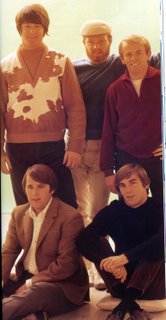 There are two distinct sets of Beach Boys. I kind of like the cars, girls and surfboards music of the Mike Love Beach Boys but what made my list was the mid-sixties Brian Wilson Beach Boys who ALMOST brought you SMILE. The rest of the group humored Brian on his growing stretches in music but didn’t really "get" him. Of course, Brian’s fragile mental state didn’t really help the matter so for years, he simply sat and lightly played keyboards to LITTLE DEUCE COUPE and CALIFORNIA GIRLS over and over and over. Listening to those two or three years of Beach Boys music now, though, it still sounds fresh, original, amazing and the work of a uniquely talented genius.
There are two distinct sets of Beach Boys. I kind of like the cars, girls and surfboards music of the Mike Love Beach Boys but what made my list was the mid-sixties Brian Wilson Beach Boys who ALMOST brought you SMILE. The rest of the group humored Brian on his growing stretches in music but didn’t really "get" him. Of course, Brian’s fragile mental state didn’t really help the matter so for years, he simply sat and lightly played keyboards to LITTLE DEUCE COUPE and CALIFORNIA GIRLS over and over and over. Listening to those two or three years of Beach Boys music now, though, it still sounds fresh, original, amazing and the work of a uniquely talented genius.3)
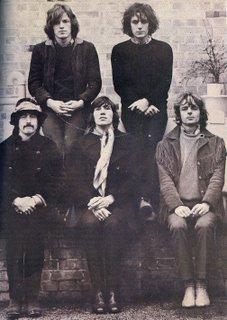 I don’t know if I’d use those same words to describe Syd Barrett although I know some do. I see Syd’s work more as a riveting look at a fragile mind imploding on itself and sharing strangely melodic bits and pieces as it does so. I’d known Pink Floyd’s music for years but I don’t think I would’ve added them to this list if not for the fact that I discovered Barrett’s work just a couple years back. It truly is amazing. SEE EMILY PLAY and BIKE are quintessential early psychedelia and JUGBAND BLUES, especially in the existing film made for it, is eerie to the extreme as we watch this handsome, talented young man’s mind disintegrate right before our eyes. The song itself is an audible rainbow of sound, tempered by lyrics that tell us that, on some level at least, he seemed to know exactly what was happening in his head. Much of the Floyd’s output since then has been rooted in Syd Barrett’s experimentalism. His is the ghost that haunts their every album.
I don’t know if I’d use those same words to describe Syd Barrett although I know some do. I see Syd’s work more as a riveting look at a fragile mind imploding on itself and sharing strangely melodic bits and pieces as it does so. I’d known Pink Floyd’s music for years but I don’t think I would’ve added them to this list if not for the fact that I discovered Barrett’s work just a couple years back. It truly is amazing. SEE EMILY PLAY and BIKE are quintessential early psychedelia and JUGBAND BLUES, especially in the existing film made for it, is eerie to the extreme as we watch this handsome, talented young man’s mind disintegrate right before our eyes. The song itself is an audible rainbow of sound, tempered by lyrics that tell us that, on some level at least, he seemed to know exactly what was happening in his head. Much of the Floyd’s output since then has been rooted in Syd Barrett’s experimentalism. His is the ghost that haunts their every album.4)
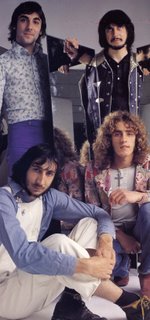 The Who were probably the hardest rocking band that honestly cared deeply about the music. In fact, Pete Townsend cared so much about the music that it sometimes became overblown and pretentious as in TOMMY, their rock opera magnum opus. Admit it, the story of the deaf, dumb and blind boy who sure plays a mean pinball is pretty one dimensional. It’s the music that matters and nearly all of the music associated with TOMMY has become classic rock. QUADROPHENIA, taken as a whole, is even more pretentious but, again, provides amazing and deeply meaningful rock music. Pete Townsend’s composing and slashing guitar meshed perfectly with Roger Daltrey’s screaming vocals, John Entwistle’s steady bass and Keith Moon’s inimitable manic drumming to provide the vary definition of the sum being better than its parts. A frustrated surf-rocker, Moon was all over the place with his drumming, crashing the cymbals at seemingly random and yet astonishingly perfect moments. He rarely came near an actual beat and probably couldn’t do so if he had tried. After his almost inevitable death, he was replaced by fellow mod-rocker (from the Small Faces) Kenny Jones. Jones was technically a much better drummer but the symbiotic relationship Moon had with the music was no longer there. Over the years since Moon’s passing, the group has broken up and reformed many times, often touring as "the Who" when, in actuality, they knew full well that they were three (and later, after Entwistle’s sudden passing, two) guys who used to be in The Who along with a bunch of backing musicians and occasionally an orchestra doing great songs made famous BY The Who.
The Who were probably the hardest rocking band that honestly cared deeply about the music. In fact, Pete Townsend cared so much about the music that it sometimes became overblown and pretentious as in TOMMY, their rock opera magnum opus. Admit it, the story of the deaf, dumb and blind boy who sure plays a mean pinball is pretty one dimensional. It’s the music that matters and nearly all of the music associated with TOMMY has become classic rock. QUADROPHENIA, taken as a whole, is even more pretentious but, again, provides amazing and deeply meaningful rock music. Pete Townsend’s composing and slashing guitar meshed perfectly with Roger Daltrey’s screaming vocals, John Entwistle’s steady bass and Keith Moon’s inimitable manic drumming to provide the vary definition of the sum being better than its parts. A frustrated surf-rocker, Moon was all over the place with his drumming, crashing the cymbals at seemingly random and yet astonishingly perfect moments. He rarely came near an actual beat and probably couldn’t do so if he had tried. After his almost inevitable death, he was replaced by fellow mod-rocker (from the Small Faces) Kenny Jones. Jones was technically a much better drummer but the symbiotic relationship Moon had with the music was no longer there. Over the years since Moon’s passing, the group has broken up and reformed many times, often touring as "the Who" when, in actuality, they knew full well that they were three (and later, after Entwistle’s sudden passing, two) guys who used to be in The Who along with a bunch of backing musicians and occasionally an orchestra doing great songs made famous BY The Who.5)
 The Yardbirds seem to have become a trivia question in the history of Led Zeppelin and that just isn’t fair. Originally, like many of the British Invasion groups, they were a blues cover band and they covered it enthusiastically. It was called a "rave up" and they did it better than just about anyone. Eric (Slow Hand) Clapton was their ace-in-the-hole guitarist when they first hit the international charts with FOR YOUR LOVE but, being a purist at the time, he jumped ship when the group decided to veer off into commercial success. The volatile Jeff Beck signed on and played searing licks and riffs through hit after hit. Eventually, they even added popular session guitarist Jimmy Page and appeared in the movie BLOW-UP with both Beck and Page. Beck left soon after, though, leaving the just arrived and raring to go Page with a group of young men who were all deeply into the mind-altering temptations of the day by that point and not really at their professional peaks. Trying to rally the Yardbirds, Page added life to a final album, LITTLE GAMES but there were no more real hits and the group found themselves playing the Xavier University Prom here in Cincinnati in 1968! It was a far cry from the venues of just two or three years earlier. Vocalist Keith Relf (who even with a beard resembled a blond Davy Jones) led the exodus of group members (He later founded the art rock group Renaissance) leaving Jimmy Page to fulfill the Yardbirds contract with a new line-up billed as "the New Yardbirds." Soon enough, this new line-up would change its name to Led Zeppelin and prepare to conquer the seventies.
The Yardbirds seem to have become a trivia question in the history of Led Zeppelin and that just isn’t fair. Originally, like many of the British Invasion groups, they were a blues cover band and they covered it enthusiastically. It was called a "rave up" and they did it better than just about anyone. Eric (Slow Hand) Clapton was their ace-in-the-hole guitarist when they first hit the international charts with FOR YOUR LOVE but, being a purist at the time, he jumped ship when the group decided to veer off into commercial success. The volatile Jeff Beck signed on and played searing licks and riffs through hit after hit. Eventually, they even added popular session guitarist Jimmy Page and appeared in the movie BLOW-UP with both Beck and Page. Beck left soon after, though, leaving the just arrived and raring to go Page with a group of young men who were all deeply into the mind-altering temptations of the day by that point and not really at their professional peaks. Trying to rally the Yardbirds, Page added life to a final album, LITTLE GAMES but there were no more real hits and the group found themselves playing the Xavier University Prom here in Cincinnati in 1968! It was a far cry from the venues of just two or three years earlier. Vocalist Keith Relf (who even with a beard resembled a blond Davy Jones) led the exodus of group members (He later founded the art rock group Renaissance) leaving Jimmy Page to fulfill the Yardbirds contract with a new line-up billed as "the New Yardbirds." Soon enough, this new line-up would change its name to Led Zeppelin and prepare to conquer the seventies.6)
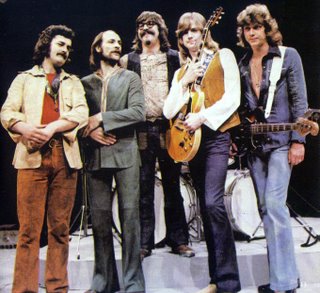 The Moody Blues were about as pretentious as you could get in rock what with overblown electronic music, full symphony accompaniment and preachy lyrics. Most of their albums in the sixties even featured poetry and one of the group’s main instruments was the flute! That said, they were an innovative prog rock group with talented musicians and a most impressive vocalist in Justin Hayward. Handsome in a kind of Edwardian way, guitarist/composer Hayward became known as the group’s lead singer in spite of the fact that all of the members sang. With songs of love and loss and philosophy and space and time, the Moodies were a great success through the early seventies, beginning a long break after the still successful I’M JUST A SINGER IN A ROCK AND ROLL BAND. Their return in the late seventies netted a few more hits but much less pretentious music and they became a touring staple. The Moody Blues was the first band I ever paid to see twice and they put on an incredible show each time. Justin Hayward really did stretch out that not on TUESDAY AFTERNOON with only one quick breath! I was amazingly amazed! Not just an oldies band, they continued to record new albums and weathered a Court TV legal scandal regarding the treatment of their second keyboardist (ex-Yes man Patrick Moraz) to reach a plateau as a classic, if slightly kitschy, rock band.
The Moody Blues were about as pretentious as you could get in rock what with overblown electronic music, full symphony accompaniment and preachy lyrics. Most of their albums in the sixties even featured poetry and one of the group’s main instruments was the flute! That said, they were an innovative prog rock group with talented musicians and a most impressive vocalist in Justin Hayward. Handsome in a kind of Edwardian way, guitarist/composer Hayward became known as the group’s lead singer in spite of the fact that all of the members sang. With songs of love and loss and philosophy and space and time, the Moodies were a great success through the early seventies, beginning a long break after the still successful I’M JUST A SINGER IN A ROCK AND ROLL BAND. Their return in the late seventies netted a few more hits but much less pretentious music and they became a touring staple. The Moody Blues was the first band I ever paid to see twice and they put on an incredible show each time. Justin Hayward really did stretch out that not on TUESDAY AFTERNOON with only one quick breath! I was amazingly amazed! Not just an oldies band, they continued to record new albums and weathered a Court TV legal scandal regarding the treatment of their second keyboardist (ex-Yes man Patrick Moraz) to reach a plateau as a classic, if slightly kitschy, rock band.7)
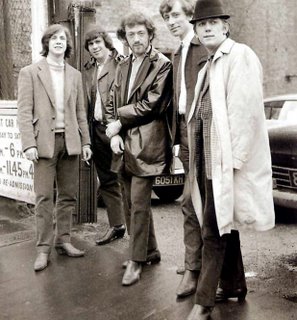 I just discovered the Pretty Things last year and I couldn’t believe I’d missed them all these years. Their early blues rave-ups are as good or better than similar songs from the Stones and the Yardbirds and their middle years psychedelia is polished and appropriately rule breaking and mindbending. DEFECTING GREY is a sound collage reminiscent of Neil Young’s BROKEN ARROW. Their rock opera, S.F. SORROW preceded the Who’s TOMMY and may actually hold together better. I’m still learning about these guys who are STILL together but they quickly jumped to the top of my favorites list due to their wide-ranging memorable music and instrumental skills.
I just discovered the Pretty Things last year and I couldn’t believe I’d missed them all these years. Their early blues rave-ups are as good or better than similar songs from the Stones and the Yardbirds and their middle years psychedelia is polished and appropriately rule breaking and mindbending. DEFECTING GREY is a sound collage reminiscent of Neil Young’s BROKEN ARROW. Their rock opera, S.F. SORROW preceded the Who’s TOMMY and may actually hold together better. I’m still learning about these guys who are STILL together but they quickly jumped to the top of my favorites list due to their wide-ranging memorable music and instrumental skills.8)
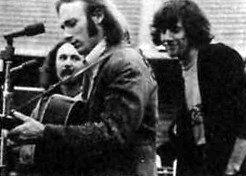 I saw Crosby, Stills and Nash around 1981. Crosby would occasionally lean in to bump his head on the microphone and think it the height of hilarity. Stills was all over the stage, even once leaping up on a piano (a trick he couldn’t do nowadays as he weighs about as much as Crosby)! Nash, as ever, seemed to be the happy glue that held his potentially explosive teammates together. From the moment I heard MARRAKESH EXPRESS on the radio in 1969, I was a fan of these classic harmonizers. Combining recognizable voices from The Hollies, the Byrds and Buffalo Springfield, CSN redefined modern folk rock in their day as a celebration of three part harmony. Then they threw in country rock and even Nash’s British sensibilities to amaze and delight. Neil Young joined and left and joined and left, etc. but Neil couldn’t harmonize with the other three. The gift was theirs and they’ve shared it abundantly over the years in spite of personal and professional problems out the proverbial. A few weeks ago, Crosby and Nash turned up on TONIGHT doing background vocals for David Gilmour. They were older, larger and greyer but the musical harmony they’ve shared for so long was still shining!
I saw Crosby, Stills and Nash around 1981. Crosby would occasionally lean in to bump his head on the microphone and think it the height of hilarity. Stills was all over the stage, even once leaping up on a piano (a trick he couldn’t do nowadays as he weighs about as much as Crosby)! Nash, as ever, seemed to be the happy glue that held his potentially explosive teammates together. From the moment I heard MARRAKESH EXPRESS on the radio in 1969, I was a fan of these classic harmonizers. Combining recognizable voices from The Hollies, the Byrds and Buffalo Springfield, CSN redefined modern folk rock in their day as a celebration of three part harmony. Then they threw in country rock and even Nash’s British sensibilities to amaze and delight. Neil Young joined and left and joined and left, etc. but Neil couldn’t harmonize with the other three. The gift was theirs and they’ve shared it abundantly over the years in spite of personal and professional problems out the proverbial. A few weeks ago, Crosby and Nash turned up on TONIGHT doing background vocals for David Gilmour. They were older, larger and greyer but the musical harmony they’ve shared for so long was still shining!9)
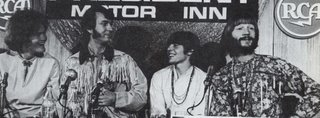 Why aren’t the Monkees in the Rock and Roll hall of Fame? Seriously. Tell me. Maybe they didn’t start out to be a real musical group but when you’re topping the charts and filling arenas, you’ve become one anyway! They didn’t play their own instruments, you say? Well neither did the Mamas and the Papas, The Four Tops or even the Beach Boys at their creative peak! Besides, they played them on tour and, bowing to pressure, played them on their own albums eventually, too. Didn’t write their own songs? From the beginning Mike Nesmith was writing Monkees songs and the others did later on. Does their corporate gestation somehow negate the rather obvious fact that Mickey and Mike were among the very best pop singers of the sixties, the fact that Nesmith’s music pioneered country rock or the plain and simple fact that the Monkees produced more memorable music than any "teen idol" group of that period or any other since? With Mike’s country background, Peter’s folk music/hippie background, Davy’s Broadway/English Music Hall background and CIRCUS BOY Mickey’s old school show biz background, it’s amazing they could make a splash at all but they did. You watched the shows, you bought the albums, you loved the music. We all still do. Isn’t about time the Monkees got some long-overdue respect?
Why aren’t the Monkees in the Rock and Roll hall of Fame? Seriously. Tell me. Maybe they didn’t start out to be a real musical group but when you’re topping the charts and filling arenas, you’ve become one anyway! They didn’t play their own instruments, you say? Well neither did the Mamas and the Papas, The Four Tops or even the Beach Boys at their creative peak! Besides, they played them on tour and, bowing to pressure, played them on their own albums eventually, too. Didn’t write their own songs? From the beginning Mike Nesmith was writing Monkees songs and the others did later on. Does their corporate gestation somehow negate the rather obvious fact that Mickey and Mike were among the very best pop singers of the sixties, the fact that Nesmith’s music pioneered country rock or the plain and simple fact that the Monkees produced more memorable music than any "teen idol" group of that period or any other since? With Mike’s country background, Peter’s folk music/hippie background, Davy’s Broadway/English Music Hall background and CIRCUS BOY Mickey’s old school show biz background, it’s amazing they could make a splash at all but they did. You watched the shows, you bought the albums, you loved the music. We all still do. Isn’t about time the Monkees got some long-overdue respect?10)
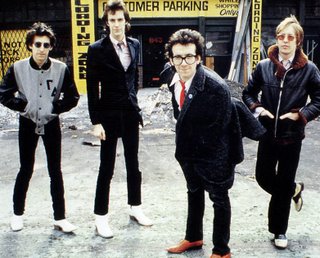 Elvis Costello burst on the scene in the late seventies as the angry young man of New Wave music. New Wave was sort of an intellectualized version of Britain’s hardcore punk rock, more tuneful and, in theory anyway, less self-destructive. Although his initial album was made with a band called Clover, he soon took over a lean power trio called the Attractions. Bruce Thomas (later a Bruce Lee biographer of all things) deftly manhandled guitar, Pete Thomas carried the beat and Steve Nieve added the trademark organ and keyboard sound. Along with Elvis himself (real name Declan McManus) on guitar, the trio brought life to their leader’s increasingly complex short songs for several years, even finding the time to do one album without Elvis. Always a volatile mix (much as Costello himself), there were rifts, break-ups and reunions. Costello soon moved into a songwriting partnership with Paul McCartney and would later write and/or perform operas, classical music, a ballet, country, an album with Burt Bacharach and a number of other critically acclaimed works, all far beyond the simplistic genius roots of PUMP IT UP. Keyboardist Steve Nieve would occasionally still accompany him on his musical journeys. When they were elected to the Rock Hall of Fame, Bruce Thomas appeared but did NOT perform with the Attractions. You know, the worst thing you can say to a creative person is that their old stuff was better but, in the case of Elvis Costello, maybe that really was the attraction.
Elvis Costello burst on the scene in the late seventies as the angry young man of New Wave music. New Wave was sort of an intellectualized version of Britain’s hardcore punk rock, more tuneful and, in theory anyway, less self-destructive. Although his initial album was made with a band called Clover, he soon took over a lean power trio called the Attractions. Bruce Thomas (later a Bruce Lee biographer of all things) deftly manhandled guitar, Pete Thomas carried the beat and Steve Nieve added the trademark organ and keyboard sound. Along with Elvis himself (real name Declan McManus) on guitar, the trio brought life to their leader’s increasingly complex short songs for several years, even finding the time to do one album without Elvis. Always a volatile mix (much as Costello himself), there were rifts, break-ups and reunions. Costello soon moved into a songwriting partnership with Paul McCartney and would later write and/or perform operas, classical music, a ballet, country, an album with Burt Bacharach and a number of other critically acclaimed works, all far beyond the simplistic genius roots of PUMP IT UP. Keyboardist Steve Nieve would occasionally still accompany him on his musical journeys. When they were elected to the Rock Hall of Fame, Bruce Thomas appeared but did NOT perform with the Attractions. You know, the worst thing you can say to a creative person is that their old stuff was better but, in the case of Elvis Costello, maybe that really was the attraction.

Enjoyed reading your list. I was and continue to be a big fan of The Monkees. You pretty much summed up my feelings about them.
ReplyDeleteMy list would certainly include the Beatles and Pink Floyd, but also Queen, Kiss (sorry, I love them) and also progressive groups from the 70's such as Yes and Genesis. There are also some great groups from the 60's, such as The Mamas and The Papas, the Zombies, the Searchers, Association and 5th Dimension.
ReplyDeleteI also like the Monkees.
You are right on about the Monkees!! Absolutely they should be in the R&R hall of Fame!!!!!!!
ReplyDeleteThe Moody Blues went through several evolutions but Justin Hayward wrote some thoughtful, romantic lyrics and his velvety, unique voice is ethereal.
ReplyDelete